Fears For Iran Bakeries As Flour Supply Halved
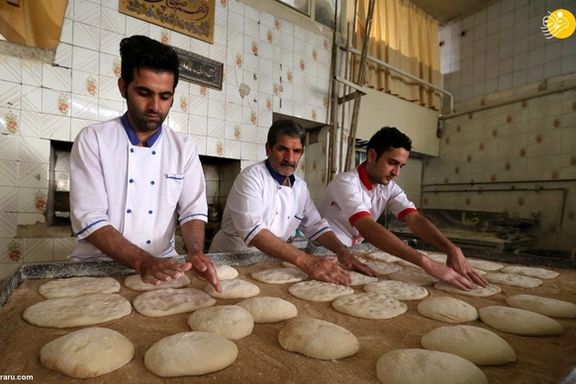
The flour allocation for some bakeries in Tehran has plunged by more than half, according to Iran’s Baker Union.

The flour allocation for some bakeries in Tehran has plunged by more than half, according to Iran’s Baker Union.
Revealing a shocking fall of 50-60% in some cases, Union Head Mohammad Soleimani told ILNA on Tuesday that “unfortunately, no government institution gives a clear response on the issue.”
He said bakers are greatly worried about the reduction of the flour allocation handed out every ten days.
Earlier, another person involved in the industry said: “While a baker's monthly quota should be 300 bags of flour, when he receives between 150 and 200 bags, he can never keep his shop open all the time.”
The report of a 50-60% reduction in the flour portion of Sangkak (a type of popular bread) bakeries in Tehran has caused concern among bakers and customers alike. The shortage of flour significantly pushes up the cost of baked goods, leading to a fall in sales.
The price of bread soared last year as the government decided to scrap the subsidy for imported wheat, flour and other essential items. The higher cost of flour is affecting a wide variety of breads, cakes and pastries including children's snacks, fast food such as hamburgers and sandwiches, and traditional noodles.
As higher prices lead to a fall in sales, the industry is faced with a drop in revenue, likely to lead to job losses in bakeries.
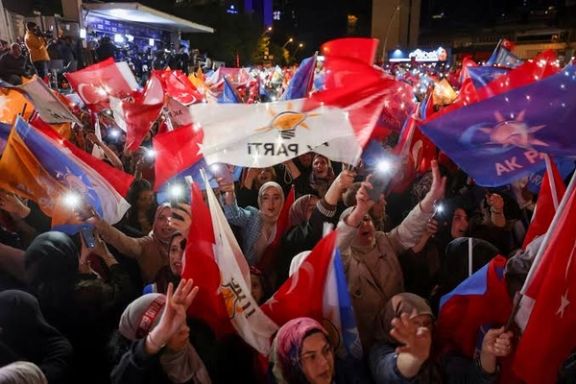
Amid popular demands for democracy and free elections, Iranians have exhibited an unusual degree of interest in Turkish elections for the first time.
Many Iranians didn't sleep all night after the polls closed in Turkey on May 14 and keenly followed election results on Iranian and international media, partly because of what an Iranian Twitter user noted as a similarity between the Turkish elections and the disputed Iranian presidential election in 2009.
International relations commentator Ehsan Movahedian wrote about the similarity: "The bipolar situation in Turkey is reminiscent of the 2009 election and its bitter consequences. Erdogan's provocative speeches reminds one of Iran's former President Mahmoud Ahmadinejad. The United States and Israel are lurking to take advantage of the situation and Iran is worried."
Just hours after polls closed in 2009, the regime announced that President Mahmoud Ahmadinejad had wone the election in the first round. Millions of voters and the losing candidate Mir-Hossein Mousavi disputed the hasty announcement and months of protests ensued. Thousands were arrested, dozens killed, and the mechanism of repression received a huge boost.
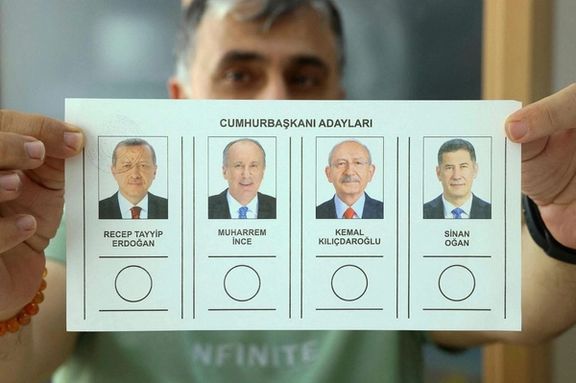
During the past few days, military forces in northeast Iran, which borders Kurdish populated eastern Turkey were put on a state of alert to control possible demonstrations following a likely victory by the opposition coalition leader Kamal Qelichdaruglu [Kilicdaroglu], social media reports said.
When the results were finally declared Monday morning, May 15, and incumbent President Recep Tayyip Erdogan and Qelicichdaruglu went through to take part in the run-off election in two weeks' time, Iranians began to ask themselves on social media where did all the interest in Turkish election come from.
The Iranian Foreign Ministry congratulated Erdogan and called the result "a victory for democracy." That was a very meaningful message from a country where a similar election in 2009 led to serious political strife with lasting deep wounds that seriously dented the legitimacy of the Islamic Republic.
The Twitter accounts of Iranian newspapers constantly updated the results throughout the night as they came in from Turkish media.
Iranian journalist Sadegh Alhosseini called the election a miracle, and called on Iranians to compare Erdogan's legacy with political dynamics in Iran and Saudi Arabia. Another Iranian journalist, Mehdi Rahbar, wrote: "This was the toughest challenge Erdogan faced during the past 20 years. And it is going tougher for him in the run-up election although Qelichdaroglu does not have a smooth path ahead of him either."
Yet another Iranian journalist, Mohammad Motlagh wrote Sunday night: "Iran is the biggest winner of Turkey's election. If Erdogan wins, that would be the beginning of the decline of NATO and probably conflicts between Turkey and Greece; and if Qelichdaroglu wins, it means harnessing the war in Caucasia [Armenia-Azerbaijan], reduction of tensions in Syria and Iraq and more interest in Russia to get closer to Iran."
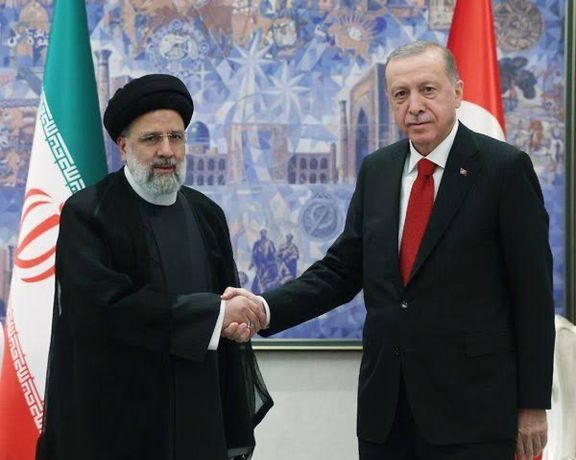
Iranian academic Fatemeh Shams wrote: "Erdogan's defeat makes me happy as Iran's defeat will do. Do not underestimate Erdogan and his Mafia's corruption and radicalism. If the opposition wins the election in Turkey many dynamics will change in the region."
Iranians saw the Turkish vote as democracy in action. As Iranian journalist Amir Hossein Mossala Pointed out, "No matter which candidate wins the election, the people of Turkey are its winners. They do not have leaders with absolute powers for life. There is no engineered election and arbitrary vetting of candidates in Turkey."
As an Iranian social media user observed, "Both sides have claimed victory, but [unlike Iran in 2009] no one attacked Qelichdaroglu's campaign or arrested its staff. SMS service has not been cut off, observers have not been expelled from polling stations, and Erdogan's supporters did not take to the streets with clubs in their hands. Turkey did not welcome darkness."
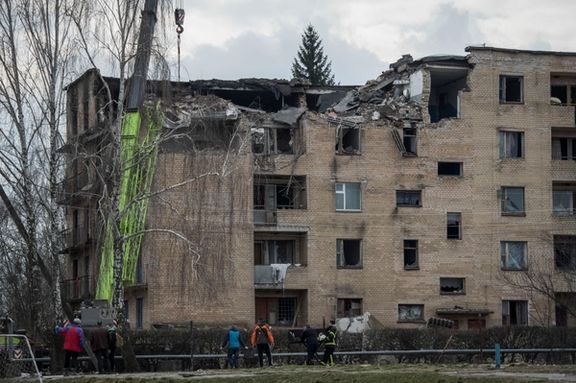
The United States believes Russia and Iran are expanding an unprecedented defense partnership that will help Moscow prolong its war in Ukraine, the White House said Monday.
As part of the cooperation, Iran is providing Russia with one-way attack drones, including more than 400 since August, national security adviser John Kirby said at a news briefing.
"This is about a burgeoning defense relationship" that allows Russia to kill more people in Ukraine and also enables Iran to stock up on its military hardware and pose a greater threat to its neighbors, Kirby told reporters.
The US and its European allies have already imposed sanctions on individuals and entities for their role in Tehran’s drone program and their delivery to Russia. Washington has also listed Tehran’s military cooperation with Moscow as one of the impediments to resuming talks aimed at limiting Iran’s nuclear program and lifting crippling economic sanctions.
Drones are the primary military help Iran is providing to Russia, which is seeking to acquire advanced level types, he said.
Russia uses Iranian Shahed drones mainly to target civilian infrastructure and also swarm Ukrainian air defenses during large-scale missile strikes. The tactic was repeatedly used last year when Moscow tried to cripple Ukraine’s energy sector.
The Unites States will be announcing additional designations targeting increased military cooperation between Russia and Iran, Kirby added.
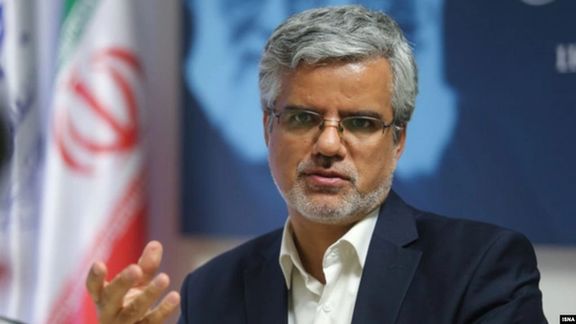
Former Iranian Member of Parliament Mahmoud Sadeghi has been summoned to the security prosecutor's office after recent criticisms of the regime on social media.
Publishing the picture of his summons on Twitter, this former representative wrote that he should go to the seventh branch of the Security Prosecutor's Office located in Evin prison in Tehran on May 23.
There is no accusation mentioned in the notice, but it is stated that the former reformist MP will be arrested if he does not show up.
Sadeghi is an Iranian lawyer, jurist, and academic who was a member of the parliament representing Tehran from May 2016 to May 2020.
Sadeghi is an associate professor at the Tarbiat Modares University and his field of expertise is Private law.
In 2016, he appeared before the special court for culture and media in Tehran to answer questions about his comments on possible corruption among senior officials. He was released after posting a bond, but later he was sentenced to 21 months of discretionary custodial imprisonment.
Sadeghi has been summoned several times since 2016, but refused to appear before the court, citing his legislative immunity. Judicial authorities attempted to arrest Sadeghi at his home in Tehran at the time with an arrest warrant based on a plaintiffs’ case against him.
He was heading a new faction in parliament which was charged with helping ensure “transparency and purification of the economy.”
His remarks on the personal bank accounts of the judiciary chief put him in trouble. Sadeghi asked the justice minister to explain the reason behind the alleged transfer of public funds to the personal accounts of the then Judiciary Chief Sadegh Larijani.
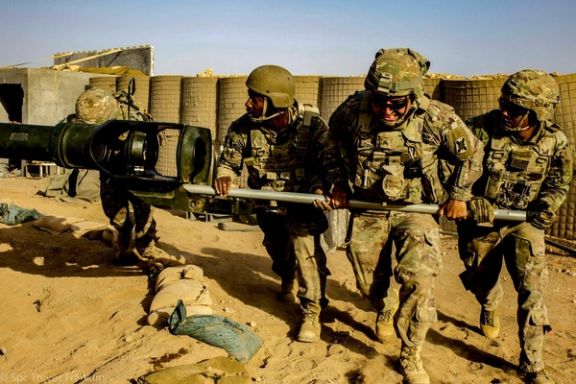
A US official says several American civilians and military personnel were wounded and a contractor was killed by a drone attack from an Iranian-backed militia in northern Iraq on March 23.
The origin of that attack had never been reported, but a senior US military official acknowledged it to The Wall Street Journal on Saturday.
As a result of the attack on a maintenance hangar near Hasakah, Syria, the US contractor was killed, making it the first American fatality since Biden took office. Injuries also affected 24 US service members, many of whom suffered traumatic brain injuries.
“When that attack happened, we did not know the launch point. We were able to exploit the engine of the drone, which had a serial number, which clearly tied it back to Iran,” the senior US official said.
“We’re not looking to get into tit for tat skirmishes with these groups, which some of the groups want us to do,” said the senior US official. “Our policy is to hold Iran accountable for all these attacks.”
It is clear from the strikes that the Biden administration faces difficulties in the Middle East as it shifts its military focus to deterring China and Russia.
Additionally, it highlights the challenges the United States faces in coming up with a policy to deal with Iraq 20 years after Saddam Hussein's regime fell.
Several former officials and experts have criticized the administration's approach for downplaying problems in Iraq, such as those caused by militias supported by Tehran.
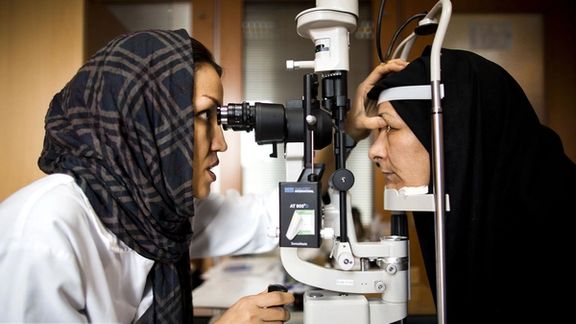
Iran’s Medical Council says no doctor has the right to refuse to accept and examine a patient over hijab issues.
However, the head of Medical Council, Mohammad Rais-Zadeh, said Sunday that no hijab-related case has been sent to the council so far.
The ruling follows reports of a doctor refusing to accept a veiled patient in the northeastern city of Mashhad.
In February, a medical office in the northeastern Iranian city of Kashmar was shut when a doctor there objected to a woman harassing a patient over her “improper clothing”.
Earlier in February, Iran’s Health Minister Bahram Einollahi said violation of hijab regulations is considered a crime at hospitals and if they do not abide by hijab regulations, they will not receive approval to operate. He added that public hospitals have been required to comply with the hijab law and provide services to women by female staff.
“Women's ultrasound should be performed by women, and in some cases that we do not have enough radiologists, we ask female general practitioners and gynecologists to be given short-term training,” underlined the minister.
The clerical regime continues to strictly enforce the "mandatory hijab", despite the mass protests that followed the death in custody last September of 22-year-old Mahsa Amini, who had been arrested by the morality police for defying modesty rules.
About a month before the death of Mahsa Amini, the so-called morality police had started patrolling medical and academic centers in Iran’s northeastern city of Mashhad to enforce compliance with the Islamic dress code. Social media users earlier reported the presence of teams from what the Islamic Republic calls the ‘Enjoining right and forbidding vice headquarters’ in various wards of hospitals and medical centers in other cities, with some reports of pressures on hospitals to separate male and female patients admitted to the ICU.
The uprising has made it increasingly difficult for the clerical regime to enforce the mandatory Islamic dress code. Appearing in public without a full veil has become a common sight even in small and more conservative towns. Since the beginning of the ‘Women, Life, Liberty’ movement in September last year, thousands of girls and women have set fire to their headscarves in a symbolic move and voiced opposition to compulsory hijab.
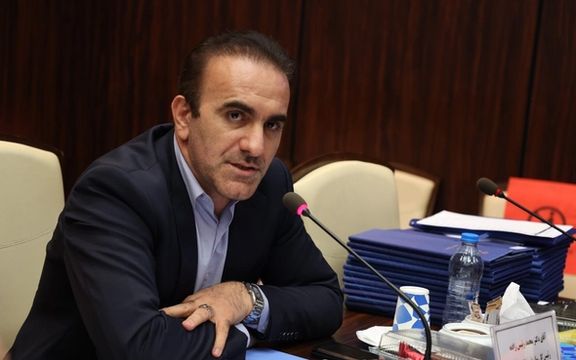
Rais-Zadeh also voiced his concern over the low income of doctors and surgeons, saying current wages mean no one would study for many years to qualify.
Iran’s medical profession is facing a crisis as more and more doctors leave the country for better wages and working conditions.
Driven by economic and professional problems, as well as lack of social and political freedoms, an increasing number of Iran's healthcare professionals emigrate.
There are no transparent data on the emigration of healthcare and other professionals, but medical officials and lawmakers often offer fragmentary information on the scope of the problem. The number of doctors emigrating has more than doubled in the past decade, according to one report.
Thousands of physicians, dentists, midwives, and nurses have either emigrated in the past few years or are planning to leave for other countries. Many in Iran, including lawmakers, have repeatedly warned that the ever-increasing desire of healthcare professionals to leave will result in the deterioration of the country’s healthcare system.
In February, Mohammad Sharifi-Moghadam, a member of the central council of Iran's Nurses’ Organization, said between 2,500 to 3,000 nurses were emigrating from Iran each year, based on the number of requests for good standing certificates, confirming that the applicant is entitled to practice medicine in the country.
The average salary for a doctor in Iran is about $400 per month, against ten as much or more in the US and UK. Physicians and other health professionals’ maximum fees as well as private hospitals’ tariffs are set and announced by the government annually.
Mohammad-Ali Mohseni-Bandpey, a member of the parliament health committee, said last year that wrong government policies affecting doctors included ignoring their needs and demands and refusing to allow them to raise their fees despite higher costs of living and running their practices. According to Mohseni-Bandpey, despite an almost 50 percent annual inflation rate, the government is trying to prevent a similar increase in doctors’ fees, to keep healthcare costs down. He suggested that the government should allow them to increase their fees but shift the burden to insurance companies rather than patients.
Doctors in Iran must also contend with a lack of adequate medical equipment and resources.
With fewer doctors available to provide care, the quality of medical care in Iran is declining, especially in rural areas, where access is already limited.
Moreover, medical schools are struggling to attract and retain students, leaving the future of the medical profession in Iran in doubt.
A major investment in the healthcare system, as well as increased funding for medical schools and hospitals is required to salvage the situation and stop the flood of emigrating doctors. However, Iran’s dire financial plight means such investment is impossible for the foreseeable future.